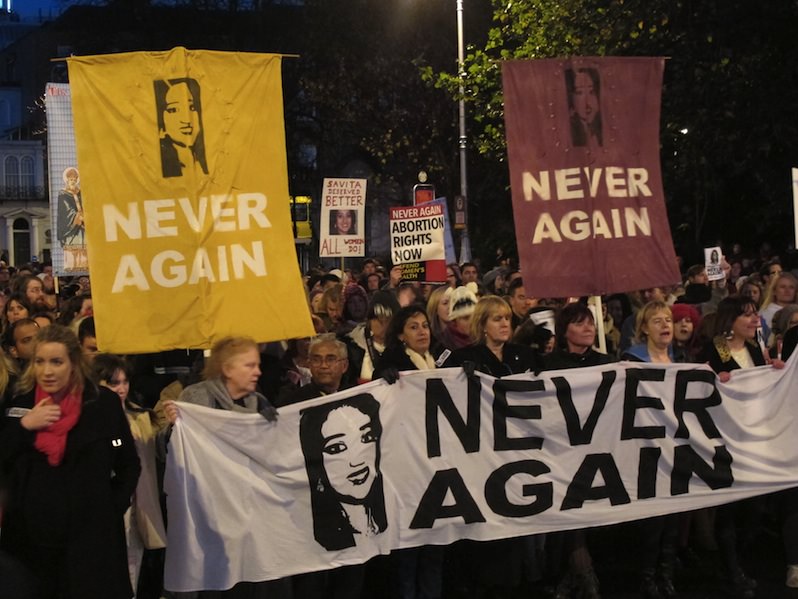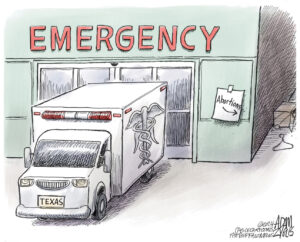It’s Time for Ireland to Stop Punishing Pregnant Women
For Ireland’s women, the culture of shame still lingers in the country's archaic reproductive rights stance. Abortion rights protesters bearing pictures of Savita Halappanavar march through central Dublin in 2012 demanding that Ireland's government allow abortions to be performed to save a woman's life. AP/Shawn Pogatchnik
Abortion rights protesters bearing pictures of Savita Halappanavar march through central Dublin in 2012 demanding that Ireland's government allow abortions to be performed to save a woman's life. AP/Shawn Pogatchnik
By Róisín Davis
In the wake of the Tuam scandal, the Irish government has announced that it will launch an investigation into the high mortality rates in its former mother and baby homes. For Ireland’s women, the culture of shame still lingers in the country’s archaic reproductive rights stance.
We now know that between 1925 and 1961, almost 800 children died in Bon Secours Mother and Baby Home in Tuam, County Galway. They were buried in an unmarked plot. No burial records were kept for individual children, and we would not have known of the mass grave but for local historian Catherine Corless’ painstaking research and her determination that the deaths be acknowledged.
These little lost souls were the children of Ireland’s “fallen” women. Their lives were deemed illegitimate by the Catholic orders that the state subsidized to run these homes. Records reported Wednesday show that almost 80 percent of babies born at Bon Secours did not make it to their first birthday. Those who managed to survive longer were raised almost as slaves and as Ireland Taoiseach (prime minister) Enda Kenny recently recognized, were treated as “… an inferior sub-species.”
The Bon Secours “mother and baby home” was more accurately a penal workhouse — one of 10 run by religious orders in Ireland. From 1922 to 1996, they incarcerated approximately 35,000 unmarried women. Those who gave birth before entering or while there had their babies forcibly removed from them.
Conditions in these so-called homes were horrific. A report from the United Nations Committee Against Torture in February noted that “girls placed in these institutions were forced to work in slavery-like conditions and were often subject to inhuman, cruel and degrading treatment as well as to physical and sexual abuse.” The U.N. account adds that “girls were deprived of their identity, of education and often of food and essential medicines and were imposed with an obligation of silence and prohibited from having any contact with the outside world.”
Likewise, accounts going back to the 1940s indicate widespread malnutrition among the institutionalized girls’ babies and small children. It would not be surprising if forensic investigation of the tiny skeletons reveals that some of the children were essentially killed by neglect and maltreatment. So much for their sacred “right to life.”
Tuam’s secret graveyard is a monument to the Ireland of Eamon de Valera, where church and state openly colluded to ensure that socially unacceptable pregnancy was punished and hidden from sight. Irish women had no access to contraception or abortion, and in the case of the girls confined in these institutions, no right to keep and raise their babies. Conceiving life was criminalized without a permit from the church.
This was long ago, and surely such monstrous practices are just dark history? But just two years ago and a few miles away from Tuam, 31-year-old dentist Savita Halappanavar died “in agony” at a Galway hospital because staffers were barred from conducting the abortion that would have saved her life during a catastrophic miscarriage. Indeed, the attending midwife told Halappanavar that an abortion could not be carried out because Ireland is a “Catholic country.”
Halappanavar’s death led to international outrage, but abortion remains a criminal offense in Ireland, north and south. Under the law, doctors are still prohibited from performing abortions on women whose lives are endangered in labor or are carrying a fetus with a fatal abnormality. The same restriction applies to women who have been the victims of rape or incest. In fact, the 14-year sentence for self-abortion tends to be doubled in cases of rape.
The best efforts of international entities such as Amnesty International, the U.N. Committee Against Torture and the U.N. Human Rights Committee have failed to make an impact on Ireland’s draconian stance on reproductive rights. In 2010, the European Court of Human Rights found Ireland to have violated the rights of a woman seeking a termination in Britain.
It’s been estimated that from 1980 to 2012, at least 154,573 women living in Ireland traveled to England and Wales to access safe abortion services. This averages out to about 4,000 women per year. The actual number may be much higher, but stigma and discrimination impose a vow of silence.
The vast majority of Irish women seeking an abortion travel alone, their pregnancy shrouded in secrecy. They receive no support or information from the government. Beyond the psychological and physical difficulty of these journeys, termination in Britain can be prohibitively expensive.
According to the Irish Family Planning Association, “women travelling from Ireland tend to have later abortions because of the need to raise significant funds, organize childcare, negotiate time off work and make travel and accommodation plans. Travelling to the UK for a surgical abortion below 14 weeks of gestation costs at least €1000 [$1,350].” This figure does not include indirect costs such as child care and loss of income.
This means, of course, that the option to travel to Britain for a termination is limited to those who can afford it. Indigent women are still forced to resort to incredibly dangerous methods of self-abortion.
The denial of reproductive choice, even in extreme cases, casts a shadow over all of Ireland’s claims to modernity and democracy. How many more mass graves, and how many more Savitas, will be tolerated before the shame is over?
Róisín Davis is a journalist and researcher originally from Belfast, Northern Ireland. She has a background in social research and community work and an M.A. in economic history from the University of Barcelona. She is based in Los Angeles and is enrolled in a journalism program at UCLA.
Your support matters…Independent journalism is under threat and overshadowed by heavily funded mainstream media.
You can help level the playing field. Become a member.
Your tax-deductible contribution keeps us digging beneath the headlines to give you thought-provoking, investigative reporting and analysis that unearths what's really happening- without compromise.
Give today to support our courageous, independent journalists.






You need to be a supporter to comment.
There are currently no responses to this article.
Be the first to respond.